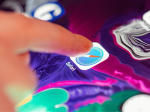Shutterstock
- Apple may in some cases share web address information with Chinese tech giant Tencent as part of a safety feature that monitors for phishing scams.
- Apple shares some web address data with Tencent Safe Browsing and Google Safe Browsing before a user visits a website to ensure that it's not a phishing scam.
- The feature is attracting attention amid heightened concerns about the relationships between United States tech firms and China.
- Visit Business Insider's homepage for more stories.
An Apple feature that shares information with Chinese tech behemoth Tencent is attracting attention amid heightened concerns about the relationships between US tech firms and China.
Apple may share certain information about the websites you visit through Safari on your iPhone with Tencent as part of a safety feature that checks for phishing scams. The feature was recently highlighted by privacy news blog Reclaim the Net.
As part of its Fraudulent Website Warning feature, Apple says it may share some information from a website's address as well as a user's IP address with Google Safe Browsing and Tencent Safe Browsing before visiting that website. This process is done to check whether or not the website a user is trying to visit is a phishing scheme attempting to steal personal information.
This Fraudulent Website Warning feature is turned on by default in iOS 13, and Apple's description of it reads as follows:
"When Fraudulent Website Warning is enabled, Safari will display a warning if the website you are visiting is a suspected phishing website. Phishing is a fraudulent attempt to steal your personal information, such as user names, passwords, and other account information. A fraudulent website masquerades as a legitimate one, such as a bank, financial institution, or email service provider. Before visiting a website, Safari may send information calculated from the website address to Google Safe Browsing and Tencent Safe Browsing to check if the website is fraudulent. These safe browsing providers may also log your IP address."Fraudulent Website Warning can be turned off by launching the settings menu on your iPhone, choosing "Safari," and toggling the switch next to "Fraudulent Website Warning." Doing so, however, could leave you vulnerable to malicious websites.
Read more: Apple's next iPhone could mark a new era for the company as it moves beyond smartphones
It's not the first time it's been discovered that Apple may share some website information from Safari with Tencent. Some users spotted the above disclaimer in Safari's Privacy section as far back as February in the beta for iOS 12.2.
Business Insider has asked Apple for more information about its Fraudulent Website Warning feature and for how long it has been sharing information with Tencent. We will update this article accordingly when we hear back.
Tencent is a technology company headquartered in Shenzhen, China, that operates in a range of industries from instant messaging to mobile payments and entertainment. Tencent owns WeChat, the popular messaging app with one billion daily users, and has grown to become a major player in the video game industry. It owns a 40% stake in Epic Games, the firm behind "Fortnite," and owns Riot Games, the studio behind "League of Legends" and "Teamfight Tactics." In its annual ranking, Forbes listed Tencent Holdings as the ninth largest technology company in the world.
The discovery that Apple may sometimes share some website data with Tencent comes amid heightened tensions between US tech companies and China. California-based video game giant Blizzard Entertainment recently faced backlash for banning a competitive "Hearthstone" player after he voiced his support for the ongoing protests in Hong Kong.
Apple had also fallen under some scrutiny last week after it removed an app from the App Store used by Hong Kong protesters to monitor police activity. Apple CEO Tim Cook defended his company's decision in a letter to employees obtained by Bloomberg's Mark Gurman, saying that the app was nixed because it was being used to "maliciously target individual officers for violence" and "victimize individuals and property where no police are present."
The fact that Chinese firms like Tencent are required to help the government with intelligence work if asked certainly doesn't help ease concerns about potential espionage — an issue that's been amplified in the public eye since Huawei was placed on a blacklist that prevents it from working with US companies back in May.
NOW WATCH: The incredible story behind Slack, the app that's taken over offices everywhere
See Also:
- How to cancel your Audible subscription on an iPhone
- How to add or delete playlists on your iPhone's Music app to organize your music
- How to change your country of residence on an iPhone, and make sure your Apple ID still works abroad
SEE ALSO: Here are all of the new products Apple is expected to launch by the end of the year


